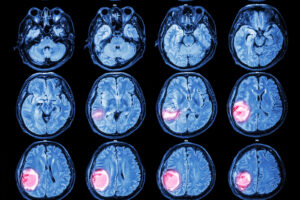
Cultivate Your Garden
Tasty and easy to grow at home, these are some of cW’s favorite medicinal and cancer-fighting herbs.
7.
Fascin-ating: A study published in eLife has shown that a protein called fascin acts in the control center of cancer cells and influences their ability to repair themselves, grow and move. Conducting more research into how fascin works may help scientists learn how to block its action when it comes to cancer.
8.
Mouthing Off: New Project Grants from the Canadian Institutes of Health Research (CIHR) are set to help develop research in what role bacteria play in mouth sores caused by chemotherapy by mimicking bacteria combinations found in children’s mouths with cancer. This will help researchers understand how microbes interact with oral cells during chemotherapy to identify bacteria that may offer protection.
9.
6.
Go Green: Research at Nippon Medical School shows how nature and rural areas benefit your health more than urban areas. Researchers observed that walking in areas with more greenery reduces stress and blood pressure far more effectively than walks in urban settings. Plants can boost our immune systems and raise our number of natural killer cells, which seek out and destroy tumor cells.
7.
Fascin-ating: A study published in eLife has shown that a protein called fascin acts in the control center of cancer cells and influences their ability to repair themselves, grow and move. Conducting more research into how fascin works may help scientists learn how to block its action when it comes to cancer.
8.
Mouthing Off: New Project Grants from the Canadian Institutes of Health Research (CIHR) are set to help develop research in what role bacteria play in mouth sores caused by chemotherapy by mimicking bacteria combinations found in children’s mouths with cancer. This will help researchers understand how microbes interact with oral cells during chemotherapy to identify bacteria that may offer protection.
9.
5.
Oiled Up: According to an analysis published in PloS One, components of olive oil offer protection against several types of cancer. The study found significant disparities in cancer risks between people who consumed olive oils and people who did not. Olive oil is rich in monounsaturated fatty acids, squalene and phenolic compounds.
6.
Go Green: Research at Nippon Medical School shows how nature and rural areas benefit your health more than urban areas. Researchers observed that walking in areas with more greenery reduces stress and blood pressure far more effectively than walks in urban settings. Plants can boost our immune systems and raise our number of natural killer cells, which seek out and destroy tumor cells.
7.
Fascin-ating: A study published in eLife has shown that a protein called fascin acts in the control center of cancer cells and influences their ability to repair themselves, grow and move. Conducting more research into how fascin works may help scientists learn how to block its action when it comes to cancer.
8.
Mouthing Off: New Project Grants from the Canadian Institutes of Health Research (CIHR) are set to help develop research in what role bacteria play in mouth sores caused by chemotherapy by mimicking bacteria combinations found in children’s mouths with cancer. This will help researchers understand how microbes interact with oral cells during chemotherapy to identify bacteria that may offer protection.
9.
4.
Live(r) and Learn: Investigators at Cedars-Sinai Cancer have created a blood test that uses the same polymerase chain reaction technology, made commonly available during the COVID-19 pandemic, to detect the most common form of liver cancer at an early enough stage that cure is possible.
5.
Oiled Up: According to an analysis published in PloS One, components of olive oil offer protection against several types of cancer. The study found significant disparities in cancer risks between people who consumed olive oils and people who did not. Olive oil is rich in monounsaturated fatty acids, squalene and phenolic compounds.
6.
Go Green: Research at Nippon Medical School shows how nature and rural areas benefit your health more than urban areas. Researchers observed that walking in areas with more greenery reduces stress and blood pressure far more effectively than walks in urban settings. Plants can boost our immune systems and raise our number of natural killer cells, which seek out and destroy tumor cells.
7.
Fascin-ating: A study published in eLife has shown that a protein called fascin acts in the control center of cancer cells and influences their ability to repair themselves, grow and move. Conducting more research into how fascin works may help scientists learn how to block its action when it comes to cancer.
8.
Mouthing Off: New Project Grants from the Canadian Institutes of Health Research (CIHR) are set to help develop research in what role bacteria play in mouth sores caused by chemotherapy by mimicking bacteria combinations found in children’s mouths with cancer. This will help researchers understand how microbes interact with oral cells during chemotherapy to identify bacteria that may offer protection.
9.
3.
Thymus-n’t Stop Now: There may be news on the horizon for thymic cancer. Weill Cornell Medicine is developing a new preclinical model that revealed how a common mutation found in thymic epithelial tumors spark their formation. The model may be able to speed the development of targeted therapies for cancer of the thymus gland.
4.
Live(r) and Learn: Investigators at Cedars-Sinai Cancer have created a blood test that uses the same polymerase chain reaction technology, made commonly available during the COVID-19 pandemic, to detect the most common form of liver cancer at an early enough stage that cure is possible.
5.
Oiled Up: According to an analysis published in PloS One, components of olive oil offer protection against several types of cancer. The study found significant disparities in cancer risks between people who consumed olive oils and people who did not. Olive oil is rich in monounsaturated fatty acids, squalene and phenolic compounds.
6.
Go Green: Research at Nippon Medical School shows how nature and rural areas benefit your health more than urban areas. Researchers observed that walking in areas with more greenery reduces stress and blood pressure far more effectively than walks in urban settings. Plants can boost our immune systems and raise our number of natural killer cells, which seek out and destroy tumor cells.
7.
Fascin-ating: A study published in eLife has shown that a protein called fascin acts in the control center of cancer cells and influences their ability to repair themselves, grow and move. Conducting more research into how fascin works may help scientists learn how to block its action when it comes to cancer.
8.
Mouthing Off: New Project Grants from the Canadian Institutes of Health Research (CIHR) are set to help develop research in what role bacteria play in mouth sores caused by chemotherapy by mimicking bacteria combinations found in children’s mouths with cancer. This will help researchers understand how microbes interact with oral cells during chemotherapy to identify bacteria that may offer protection.
9.
2.
Sugary Sweet: Scientists at Australia’s Griffith University’s Institute for Glycomics are researching the ability to identify unique sugars on ovarian cancer cells that could help prevent the spread of cancer and improve treatment options. These sugars may be potent therapeutic targets in the fight against the spread of ovarian cancer.
3.
Thymus-n’t Stop Now: There may be news on the horizon for thymic cancer. Weill Cornell Medicine is developing a new preclinical model that revealed how a common mutation found in thymic epithelial tumors spark their formation. The model may be able to speed the development of targeted therapies for cancer of the thymus gland.
4.
Live(r) and Learn: Investigators at Cedars-Sinai Cancer have created a blood test that uses the same polymerase chain reaction technology, made commonly available during the COVID-19 pandemic, to detect the most common form of liver cancer at an early enough stage that cure is possible.
5.
Oiled Up: According to an analysis published in PloS One, components of olive oil offer protection against several types of cancer. The study found significant disparities in cancer risks between people who consumed olive oils and people who did not. Olive oil is rich in monounsaturated fatty acids, squalene and phenolic compounds.
6.
Go Green: Research at Nippon Medical School shows how nature and rural areas benefit your health more than urban areas. Researchers observed that walking in areas with more greenery reduces stress and blood pressure far more effectively than walks in urban settings. Plants can boost our immune systems and raise our number of natural killer cells, which seek out and destroy tumor cells.
7.
Fascin-ating: A study published in eLife has shown that a protein called fascin acts in the control center of cancer cells and influences their ability to repair themselves, grow and move. Conducting more research into how fascin works may help scientists learn how to block its action when it comes to cancer.
8.
Mouthing Off: New Project Grants from the Canadian Institutes of Health Research (CIHR) are set to help develop research in what role bacteria play in mouth sores caused by chemotherapy by mimicking bacteria combinations found in children’s mouths with cancer. This will help researchers understand how microbes interact with oral cells during chemotherapy to identify bacteria that may offer protection.
9.
1.
A Plus for PREMMplus: Developed by researchers and physicians at Dana-Farber Cancer Institute, an online tool known as PREMMplus quickly and accurately identifies people who should undergo testing for inherited genetic changes — specifically, ones that increase the risk of developing certain cancers, simply by asking users health-related questions.
2.
Sugary Sweet: Scientists at Australia’s Griffith University’s Institute for Glycomics are researching the ability to identify unique sugars on ovarian cancer cells that could help prevent the spread of cancer and improve treatment options. These sugars may be potent therapeutic targets in the fight against the spread of ovarian cancer.
3.
Thymus-n’t Stop Now: There may be news on the horizon for thymic cancer. Weill Cornell Medicine is developing a new preclinical model that revealed how a common mutation found in thymic epithelial tumors spark their formation. The model may be able to speed the development of targeted therapies for cancer of the thymus gland.
4.
Live(r) and Learn: Investigators at Cedars-Sinai Cancer have created a blood test that uses the same polymerase chain reaction technology, made commonly available during the COVID-19 pandemic, to detect the most common form of liver cancer at an early enough stage that cure is possible.
5.
Oiled Up: According to an analysis published in PloS One, components of olive oil offer protection against several types of cancer. The study found significant disparities in cancer risks between people who consumed olive oils and people who did not. Olive oil is rich in monounsaturated fatty acids, squalene and phenolic compounds.
6.
Go Green: Research at Nippon Medical School shows how nature and rural areas benefit your health more than urban areas. Researchers observed that walking in areas with more greenery reduces stress and blood pressure far more effectively than walks in urban settings. Plants can boost our immune systems and raise our number of natural killer cells, which seek out and destroy tumor cells.
7.
Fascin-ating: A study published in eLife has shown that a protein called fascin acts in the control center of cancer cells and influences their ability to repair themselves, grow and move. Conducting more research into how fascin works may help scientists learn how to block its action when it comes to cancer.
8.
Mouthing Off: New Project Grants from the Canadian Institutes of Health Research (CIHR) are set to help develop research in what role bacteria play in mouth sores caused by chemotherapy by mimicking bacteria combinations found in children’s mouths with cancer. This will help researchers understand how microbes interact with oral cells during chemotherapy to identify bacteria that may offer protection.
9.
1.
A Plus for PREMMplus: Developed by researchers and physicians at Dana-Farber Cancer Institute, an online tool known as PREMMplus quickly and accurately identifies people who should undergo testing for inherited genetic changes — specifically, ones that increase the risk of developing certain cancers, simply by asking users health-related questions.
2.
Sugary Sweet: Scientists at Australia’s Griffith University’s Institute for Glycomics are researching the ability to identify unique sugars on ovarian cancer cells that could help prevent the spread of cancer and improve treatment options. These sugars may be potent therapeutic targets in the fight against the spread of ovarian cancer.
3.
Thymus-n’t Stop Now: There may be news on the horizon for thymic cancer. Weill Cornell Medicine is developing a new preclinical model that revealed how a common mutation found in thymic epithelial tumors spark their formation. The model may be able to speed the development of targeted therapies for cancer of the thymus gland.
4.
Live(r) and Learn: Investigators at Cedars-Sinai Cancer have created a blood test that uses the same polymerase chain reaction technology, made commonly available during the COVID-19 pandemic, to detect the most common form of liver cancer at an early enough stage that cure is possible.
5.
Oiled Up: According to an analysis published in PloS One, components of olive oil offer protection against several types of cancer. The study found significant disparities in cancer risks between people who consumed olive oils and people who did not. Olive oil is rich in monounsaturated fatty acids, squalene and phenolic compounds.
6.
Go Green: Research at Nippon Medical School shows how nature and rural areas benefit your health more than urban areas. Researchers observed that walking in areas with more greenery reduces stress and blood pressure far more effectively than walks in urban settings. Plants can boost our immune systems and raise our number of natural killer cells, which seek out and destroy tumor cells.
7.
Fascin-ating: A study published in eLife has shown that a protein called fascin acts in the control center of cancer cells and influences their ability to repair themselves, grow and move. Conducting more research into how fascin works may help scientists learn how to block its action when it comes to cancer.
8.
Mouthing Off: New Project Grants from the Canadian Institutes of Health Research (CIHR) are set to help develop research in what role bacteria play in mouth sores caused by chemotherapy by mimicking bacteria combinations found in children’s mouths with cancer. This will help researchers understand how microbes interact with oral cells during chemotherapy to identify bacteria that may offer protection.
9.

Tasty and easy to grow at home, these are some of cW’s favorite medicinal and cancer-fighting herbs.

Gospel house music prodigy Dana Divine has a reputation for being the life of the party, so it’s no surprise that she brought that same upbeat energy to her cancer journey.

Actress Miranda McKeon uses her social media platform to encourage open and honest discussions about the mental and physical aspects of cancer, breaking stigmas about breast cancer and demystifying a diagnosis to her loyal followers, which number more than a million.

Stage is on a mission to empower the breast cancer community with knowledge, confidence and style. When their founder, Virginia Carnesale, learned about the harmful toxins in most beauty products after receiving her breast cancer diagnosis, she was shocked at how difficult it was to find products that were free of the most concerning ingredients — like endocrine disruptors and carcinogens. With Stage, Carnesale provides a curated selection of high-performing skincare, haircare and cosmetics to help take the guesswork out of switching to clean beauty.

Cancer clusters are difficult to confirm for many reasons, but once a cluster is identified, what comes next?

The health effects of the twin towers tragedy are only just recently being understood well.